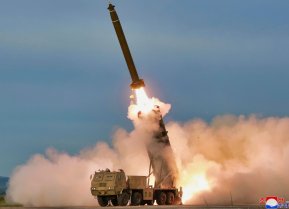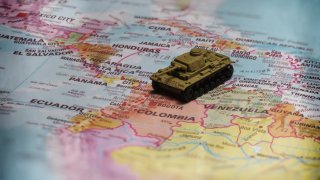Mark Twain Would Understand the Venezuela vs. Guyana Crisis
Despite a ruling from the International Court of Justice instructing Venezuela to stay its hand while the court adjudicates the territorial dispute, President Nicolás Maduro announced that he would “immediately” grant licenses permitting exploration and extraction to go forward. Maduro also announced that the Venezuelan armed forces would institute a military command to operate in Essequibo. What happens next? Mark Twain would have some interesting thoughts.
Humorist Mark Twain reputedly wisecracked that “history never repeats itself but it rhymes.” Twain would instantly grasp the recent news out of the Caribbean Sea, which rhymes, imperfectly, with events that took place during his lifetime. Last month the Venezuelan government directed state-owned enterprises to search out oil and minerals in the Essequibo region, a resource-rich borderland claimed by both Venezuela and neighboring Guyana. Government spokesmen in Caracas claim that Venezuelans overwhelmingly endorsed such a move during a referendum.
Despite a ruling from the International Court of Justice instructing Venezuela to stay its hand while the court adjudicates the territorial dispute, President Nicolás Maduro announced that he would “immediately” grant licenses permitting exploration and extraction to go forward. Maduro also announced that the Venezuelan armed forces would institute a military command to operate in Essequibo.
Needless to say, these actions did not sit well in Guyana. Its mineral wealth aside, Essequibo comprises about two-thirds of Guyana’s landmass. Letting Venezuela get its way, in other words, would verge on a national death sentence. Consequently, President Irfaan Ali vowed to ready the country’s defense forces while also holding out hope that diplomacy could resolve the dispute. That means not just pursuing one-on-one diplomacy but reaching out for foreign support. For example, Guyana, an erstwhile British colony, remains a member of the Commonwealth. At the behest of the British Ministry of Defense the Royal Navy diverted an offshore patrol vessel, HMS Trent, from counterdrug duty to Georgetown to mount a show of support.
During a meeting, Ali and Maduro agreed not to use force to settle the quarrel. But neither did they give ground on their territorial claims. The impasse persists. How the International Court of Justice will rule, and whether the disputants will obey its ruling, remains to be seen.
Now here’s the rhyme from the age of Twain. The border dispute is not a new thing. It dates to the 1870s, when the British Empire ruled Guyana. The frontier between the two countries had remained ill-defined before then, to no great effect. But then prospectors discovered gold fields in the vicinity of the Essequibo River, and all of a sudden it became of surpassing importance to demarcate a border with precision. Both contenders pushed their territorial claims—hard. After all, natural resources have a way of concentrating minds in national capitals. The more, the better.
Resources abet national development and weal.
The United States embroiled itself in the dispute in 1895, when war between Britain and Venezuela seemingly loomed. Under the Monroe Doctrine (1823), the United States had forbidden European empires either to reconquer Latin American republics that had won their independence during a spate of revolutions, or to restore indirect rule by proxy. But U.S. leaders lacked the wherewithal to enforce the doctrine for most of the nineteenth century, when the republic was consumed with spreading across a continent, fighting its civil war, and navigating an industrial revolution.
In fact, the Royal Navy in effect acted as a silent partner in the Monroe Doctrine for most of the century. That’s because Great Britain had reasons of its own for barring rival empires from returning to the Americas. Converging interests spared the United States from investing in the large standing army and navy it would have needed to put steel behind the doctrine. By the 1890s, though, the steam-propelled, armored, big-gun U.S. Navy battle fleet that would defeat Spain in 1898 was taking shape. Washington now had options of its own, including toward its former British benefactor. No longer did it have to free-ride on maritime security supplied by others.
In Washington it appeared that a border war in the Caribbean might infringe on the Monroe Doctrine, transferring land from an American state to a European empire. Venezuela was weak, Britain strong. So the presidency of Grover Cleveland intervened in the dispute in hopes of staving off war. In one particularly tart exchange between Cleveland’s secretary of state, Richard Olney, and Lord Salisbury, the British prime minister and foreign secretary, Olney proclaimed that the United States was “practically sovereign” in the Western Hemisphere. The republic’s geographic remoteness from Europe and its preponderance of armed might in the hemisphere entitled Washington to get its way.
Its “fiat,” declared Olney, was “law” in any matter in which it chose to involve itself.
Strong words. The Anglo-Venezuelan border crisis marked a new, musclebound phase in the Monroe Doctrine’s history. America had come to regard itself as a regional strongman. It demanded—and got—the right to mediate the border dispute. The border now under stress dates to 1899, the aftermath of the 1895 crisis.
There’s more to the story. A partial sequel came in 1902, when a European coalition headed by Kaiser Wilhelm II dispatched a naval squadron to Venezuelan coasts after Caracas defaulted on its debts to European banks. Worried lest Europeans seize Venezuelan ground—common practice for the day was to send the navy to seize the customs house in the defaulting nation and use tariff revenue to repay the bankers—President Theodore Roosevelt secretly ordered most of the U.S. Navy battle fleet to the Caribbean to shadow the European fleet and deter it from wresting territory from Venezuela. Such a seizure would have breached the Monroe Doctrine. Worse, once a European navy possessed a parcel of coastal ground, it might have kept it—and built a naval base in the United States’ backyard.
Principle aligned with geopolitical interests, spurring TR into action. Washington tacitly sided with Caracas to preserve Venezuelan territorial integrity, even though he had no objection to debt collection. In fact, Roosevelt went on to fashion a “corollary” to the Monroe Doctrine whereby the United States would mediate between Latin American states and Europeans, assuring American territory remained intact while the bankers got repaid.
The takeaways from these long-ago events? One, no historical parallel is exact. Back then a weak Venezuela was confronting the world’s mightiest empire; now Venezuela is on the offensive against a weaker Guyana backed by the British Commonwealth. The correlation of forces is altogether different today from then.
Nor does the rhyme suggest much about what the United States ought to do. Insofar as the Monroe Doctrine endures in U.S. foreign policy, it doesn’t apply to the current imbroglio. Forcible debt collection is no longer a thing. Nor is there the slightest chance the Royal Navy will occupy American ground beyond the 1899 frontier. Rather, one American state is seeking land from a neighboring American state in hopes of gaining possession of natural resources. This is garden-variety power politics. Territory and resources are the constant.
Two, memories run long, especially where sovereignty—the power to set the agenda within lines on the map we call borders—is at issue. Venezuela rejects the border demarcation from 1899, just as Russia rejects Ukrainian independence, and just as China rejects the settlement of the Sino-Japanese War of 1894-1895 (and a whole lot of other things besides). Seldom is even a smashing military victory final. Its results may have to be enforced more or less forever depending on the attitude taken by the vanquished.
And three, the rules-based international order has to be defended. It’s under assault—perhaps coordinated assault—not just in the Caribbean basin but in the Black Sea, Eastern Mediterranean, Red Sea, and China seas. Custodians of world order must apply themselves with equal vigor and perseverance to preserve a system that on the whole serves all nations—including its enemies—well.
History rhymes.
About the Author
Dr. James Holmes is J. C. Wylie Chair of Maritime Strategy at the U.S. Naval War College and a Distinguished Fellow at the Brute Krulak Center for Innovation & Future Warfare, Marine Corps University. The views voiced here are his alone.
Image: Shutterstock.


